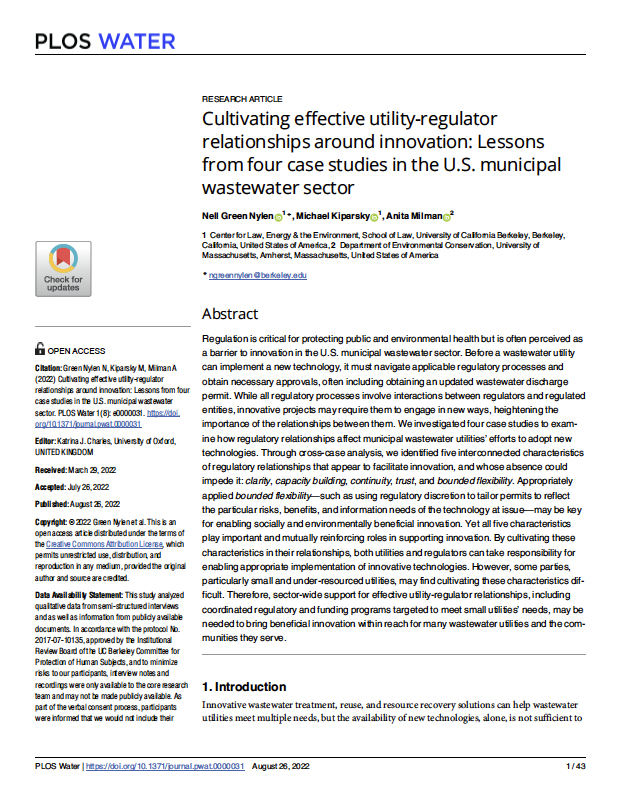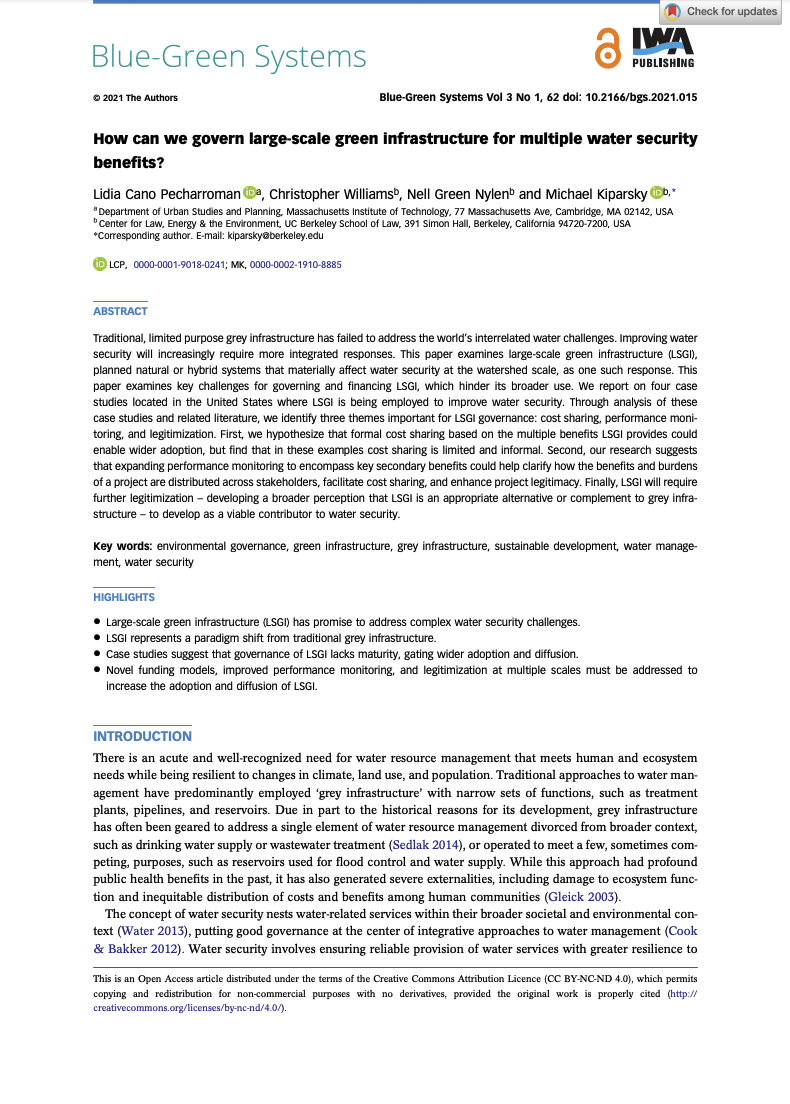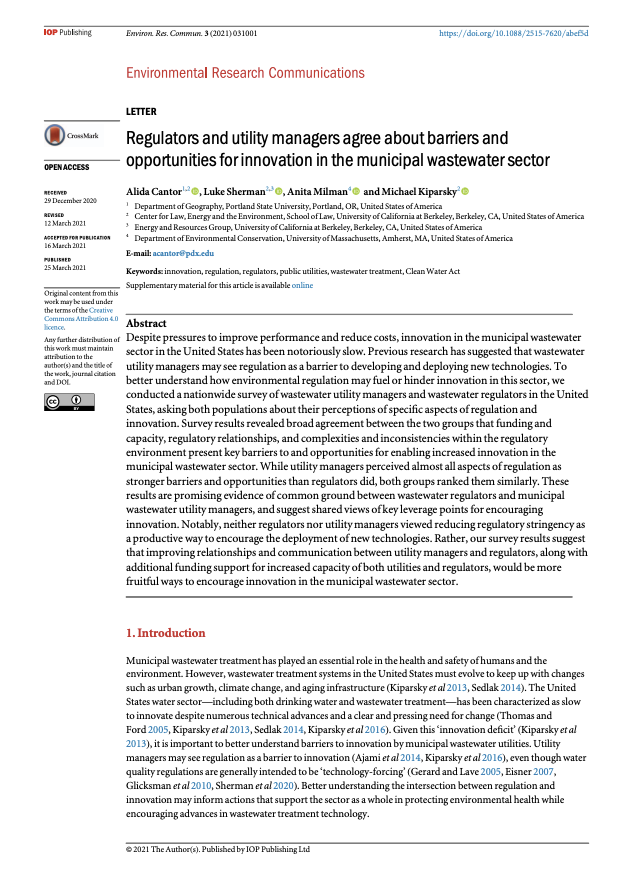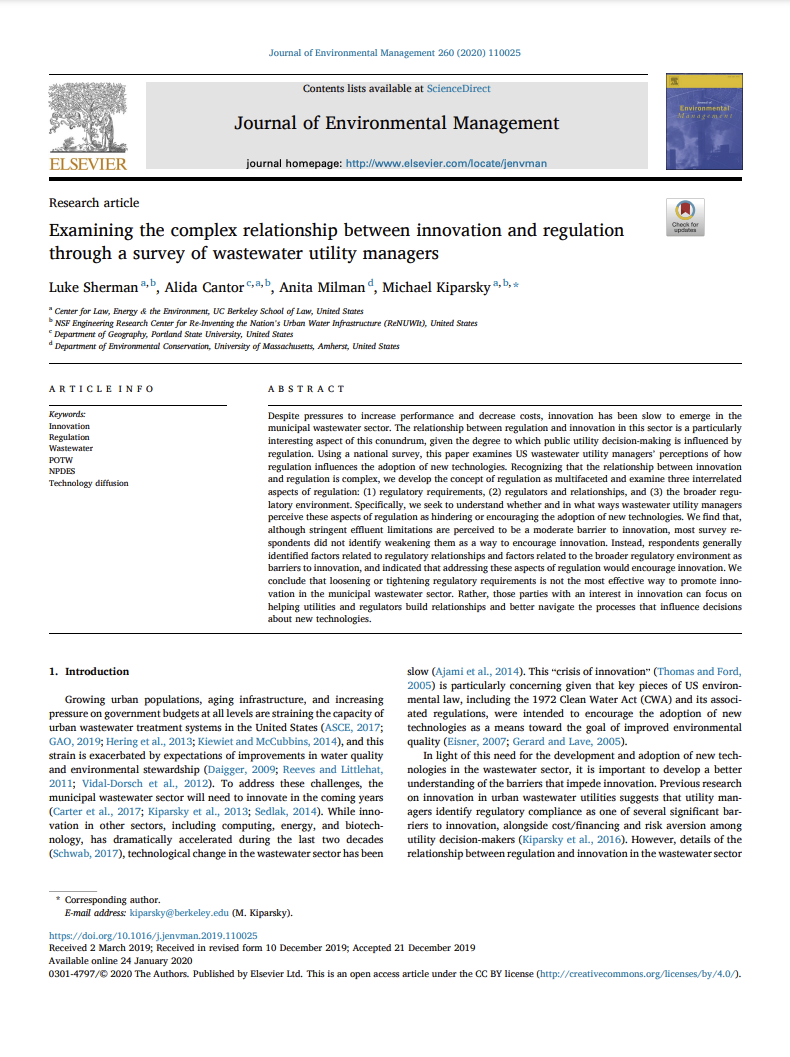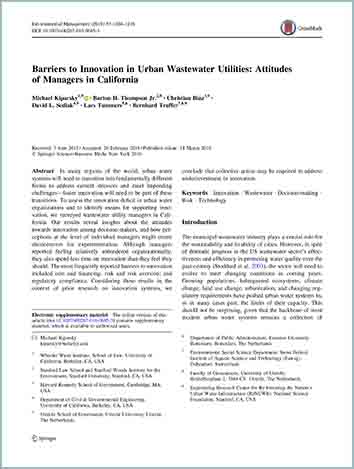Urban water systems in California need to adapt in response to changing climate, population growth, aging infrastructure, and other challenges. Adaptation will require innovative ways of managing and identifying beneficial linkages between environmental water quality, drinking water supplies, wastewater, stormwater, flood control, and other aspects of urban water.
This initiative examines barriers to urban water innovation, with an emphasis on direct potable reuse and innovation in the municipal wastewater sector, and explores ways to constructively address them.
August 2022
Cultivating effective utility-regulator relationships around innovation: Lessons from four case studies in the U.S. municipal wastewater sector
While all regulatory processes involve interactions between regulators and those they regulate, innovative projects may require these parties to engage in new ways, heightening the importance of the relationships between them. We investigated four case studies to examine how regulatory relationships affect municipal wastewater utilities’ efforts to adopt new technologies. Through cross-case analysis, we identified five interconnected characteristics of regulatory relationships that appear to facilitate innovation, and whose absence could impede it.
See our Legal Planet blog post on the role of regulatory relationships in wastewater innovation.
See our Legal Planet blog post on a decade of unraveling the effects of regulation on water innovation.
September 2021
How can we govern large-scale green infrastructure for multiple water security benefits?
Traditional, limited purpose grey infrastructure has failed to address the world’s interrelated water challenges. Improving water security will increasingly require more integrated responses. This paper examines large-scale green infrastructure (LSGI), planned natural or hybrid systems that materially affect water security at the watershed scale, as one such response. This paper examines key challenges for governing and financing LSGI, which hinder its broader use. We report on four case studies located in the United States where LSGI is being employed to improve water security. Through analysis of these case studies and related literature, we identify three themes important for LSGI governance: cost sharing, performance monitoring, and legitimization. First, we hypothesize that formal cost sharing based on the multiple benefits LSGI provides could enable wider adoption, but find that in these examples cost sharing is limited and informal. Second, our research suggests that expanding performance monitoring to encompass key secondary benefits could help clarify how the benefits and burdens of a project are distributed across stakeholders, facilitate cost sharing, and enhance project legitimacy. Finally, LSGI will require further legitimization – developing a broader perception that LSGI is an appropriate alternative or complement to grey infrastructure – to develop as a viable contributor to water security.
See our Legal Planet blog post.
March 2021
Regulators and utility managers agree about barriers and opportunities for innovation in the municipal wastewater sector
Given the many risks and the different incentives and roles of utilities and regulators in the regulation process, a common assumption is that the two groups are generally at odds with one another when it comes to their views on regulation and innovation. New research from our team shows that, on the contrary, utilities and regulators generally agree about the ways in which regulation acts as a barrier to innovation in the wastewater sector, and how innovation could be encouraged.
January 2020
Examining the complex relationship between innovation and regulation through a survey of wastewater utility managers
In order to meet the 21st century demands, innovation is needed in municipal wastewater treatment. The innovation ecosystem in municipal wastewater treatment, however, is highly complex, and regulations at multiple levels are intended to ensure that new technologies will not result in detrimental impacts to water quality. Past research from the Wheeler Water Institute has suggested that many wastewater utility managers see these regulations as a barrier to innovation. In order to better understand these perspectives, we are pursuing multiple research projects that examine the relationship between innovation and regulation in municipal wastewater.
October 2017
Of Dreamliners and Drinking Water: Developing Risk Regulation and a Safety Culture for Direct Potable Reuse
 This paper examines the notion that emerging regulation of DPR may lack sufficient attention to a particular class of risks: catastrophic risks with low probabilities of occurrence, but high consequences. We argue that proponents of DPR could benefit from proactively developing a safety culture in DPR utilities and establishing an effective industry-wide auditing organization that investigates unanticipated system failures. Developing independent oversight for DPR operation could ensure that stringent quality and management requirements are set and enforced, and that any system failures or “near misses” are investigated and adequately responded to.
This paper examines the notion that emerging regulation of DPR may lack sufficient attention to a particular class of risks: catastrophic risks with low probabilities of occurrence, but high consequences. We argue that proponents of DPR could benefit from proactively developing a safety culture in DPR utilities and establishing an effective industry-wide auditing organization that investigates unanticipated system failures. Developing independent oversight for DPR operation could ensure that stringent quality and management requirements are set and enforced, and that any system failures or “near misses” are investigated and adequately responded to.
Also see our Legal Planet blog post on safety culture with DPR
March 2016
Barriers to Innovation in Urban Wastewater Utilities: Attitudes of Managers in California
In many regions of the world, urban water systems will need to transition into fundamentally different forms to address current stressors and meet impending challenges—faster innovation will need to be part of these transitions. The results in this report reveal insights about the attitudes towards innovation among decision makers in the wastewater sector, and how perceptions at the level of individual managers might create disincentives for experimentation.
Also see our Legal Planet blog post.
February 2016
The Thorny Road to Technology Legitimation — Institutional Work for Potable Water Reuse in California
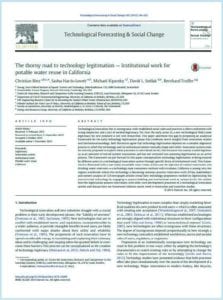 This paper addresses this gap between technological innovation and societal legitimacy by proposing an analytical framework for the early technology legitimation phase that combines recent insights from innovation studies and institutional sociology. The framework we put forward in this paper conceptualizes technology legitimation as being enacted by different actors in a technological innovation system through specific forms of institutional work. This framework is illustrated with a case study on potable water reuse, in this case the injection of treated wastewater into drinking water reservoirs — a technology most consumers confront with revulsion. We outline how the legitimation process interrelates with other core development processes of a technological innovation system and discuss how our framework informs recent work in innovation and transition studies.
This paper addresses this gap between technological innovation and societal legitimacy by proposing an analytical framework for the early technology legitimation phase that combines recent insights from innovation studies and institutional sociology. The framework we put forward in this paper conceptualizes technology legitimation as being enacted by different actors in a technological innovation system through specific forms of institutional work. This framework is illustrated with a case study on potable water reuse, in this case the injection of treated wastewater into drinking water reservoirs — a technology most consumers confront with revulsion. We outline how the legitimation process interrelates with other core development processes of a technological innovation system and discuss how our framework informs recent work in innovation and transition studies.
Also see our Legal Planet blog post on moving beyond the “yuck factor” with DPR
June 2015
Beyond User Acceptance: A Legitimacy Framework for Potable Water Reuse in California
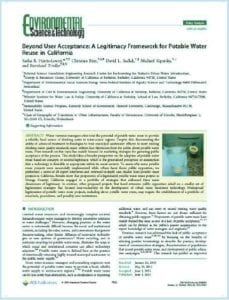 This study takes a broader perspective on the adoption of potable water reuse based on concepts of societal legitimacy, which is the generalized perception or assumption that a technology is desirable or appropriate within its social context. To assess why some potable reuse projects were successfully implemented while others faced fierce public opposition, we performed a series of 20 expert interviews and reviewed in-depth case studies from potable reuse projects in California. Results show that proponents of a legitimated potable water reuse project in Orange County, California engaged in a portfolio of strategies that addressed three main dimensions of legitimacy.
This study takes a broader perspective on the adoption of potable water reuse based on concepts of societal legitimacy, which is the generalized perception or assumption that a technology is desirable or appropriate within its social context. To assess why some potable reuse projects were successfully implemented while others faced fierce public opposition, we performed a series of 20 expert interviews and reviewed in-depth case studies from potable reuse projects in California. Results show that proponents of a legitimated potable water reuse project in Orange County, California engaged in a portfolio of strategies that addressed three main dimensions of legitimacy.
Also see our Legal Planet blog post on moving beyond the “yuck factor” with DPR
February 2015
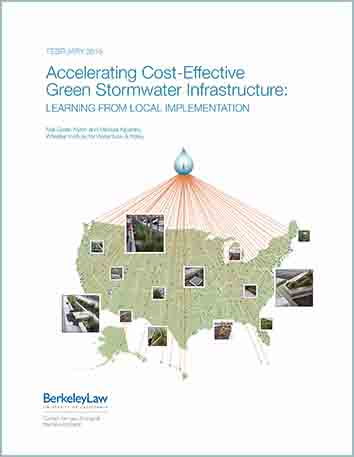 Accelerating Cost-Effective Green Stormwater Infrastructure: Learning from Local Implementation
Accelerating Cost-Effective Green Stormwater Infrastructure: Learning from Local Implementation
Although green stormwater infrastructure (GSI) is critical to solving stormwater management challenges, GSI is evolving technology with inconsistent performance and uncertain costs. Our report recommends enhancing learning from local implementation efforts to address knowledge gaps and speed cost-effective deployment. We identify key actions the EPA and state water quality authorities can take to help drive data collection and sharing.
Also see our Legal Planet blog post.
August 2013
Reducing the innovation deficit in urban water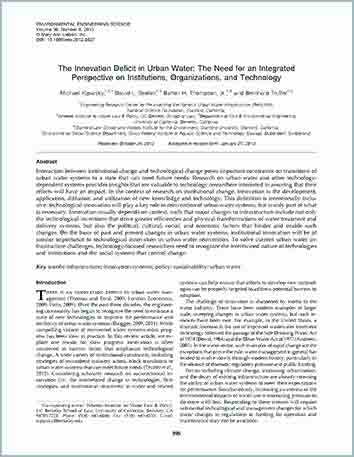
Arguably, the main barriers to developing the new technologies and management practices necessary to meet emerging challenges in the water sector will be institutional rather than technical. In collaboration with ReNUWIt researchers and others, we are working to characterize barriers to innovation, and opportunities to overcome them, including legal, regulatory, social, financial, governance, and others. We have produced a “most read” article that develops a framework for forthcoming studies on the institutional elements of innovation at various scales. We have also investigated potable water reuse for water supply augmentation, using the concept of legitimacy to develop a broader framework for what is necessary to implement water reuse projects.
